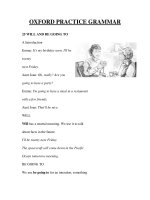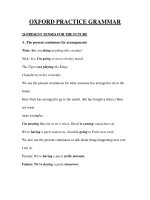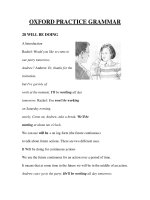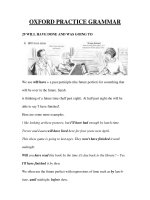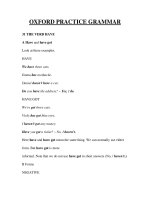Tài liệu OXFORD PRACTICE GRAMMAR 68 docx
Bạn đang xem bản rút gọn của tài liệu. Xem và tải ngay bản đầy đủ của tài liệu tại đây (86.55 KB, 7 trang )
OXFORD PRACTICE GRAMMAR
68 FOR WITH THE TO-INFINITIVE
A Introduction
Sarah: I'll just ring the office. The boss is waiting for me to ring her back.
Mark: / don't think it was a good idea for you to bring that mobile phone on
holiday with you, Sarah.
We can use for + object + to-infinitive. Here are some more examples.
FOR OBJECT TO-INFINITIVE
My mother has arranged for someone to look after her dog next week.
It's difficult for unskilled people to find work these days.
The crowd were impatient for the match to begin.
It's a nuisance for you to have to wait.
B For expressing purpose
We can use this structure to say why something is done (to express purpose).
(See also Unit 151E.
Mark photocopied the figures for the Sales Manager to have a look at. (=
He photocopied the
figures so that the Sales Manager could have a look at them.) The shop
provides baskets for the
customers to put their purchases in. I'd like to put forward a few suggestions
for you to think about.
C Too and enough
We can use too and enough with this structure. The road is too busy
for the children to cross safely. Unfortunately the table was too
small for all of us to sit round. Fortunately the table was big
enough for all of us to sit round. The guide didn't speak loudly
enough for everyone to hear clearly.
D For and of
FOR
We often use for + object + to-infinitive after an
adjective.
Harriet was anxious for the party to
be a success.
Would it be possible for you to move
your car, please?
Some of the adjectives we can use with for:
anxious, awful, cheap, convenient, dangerous,
difficult, eager, easy, exciting, expensive, friendly,
good, happy, horrible, impatient, important,
interesting, marvellous, necessary, nice, normal,
polite, possible, ready, safe, sensible, silly, stupid,
terrible, useful, willing, wonderful, wrong
Compare these two sentences.
It was good for you to come jogging. (=
It was good for your health.)
OF
After an adjective saying how someone behaves,
we use of + object + to-infinitive.
It's kind of Melanie to put you up for the night.
(Melanie is kind.)
It was clever of you to work out the answer.
(You were clever.)
Some of the adjectives we can use with of:
brave, careless, clever, foolish, generous, good,
helpful, honest, intelligent, kind, mean, nice,
polite, sensible, silly, stupid, wrong
It was good of you to come jogging with me. (=
It was a kind action by you.)
68 EXERCISES
1 For with the to-infinitive (A)
The second person agrees with what the first one says. Use for and a to-
infinitive. ►
Daniel: Andrew should take it easy. That would be best.
Matthew: Yes, you're right. It would be best for him to take it easy.
1 Trevor: Our new computer should arrive soon. I just can't wait.
Laura: Me neither.
I.............................................................................................
2 Rachel: Matthew shouldn't marry Emma. It would be a mistake.
Vicky: I think so too.
3 Customer: Advertisements should tell the truth. It's important.
Mark: I agree. ..................................................................................................
2 For expressing purpose (B)
Write the advertisement for a holiday centre.
Match the sentence pairs and write sentences with for and a to-infinitive.
There are lots of activities. There's a fun pool.
There are quiet areas. There are regular shows.
There's a siant roller-coaster.
You can enjoy them. You can relax in them. Guests
can take part in them. You can ride on it if you
dare. Children can swim in it.
► There are lots of activities for guests to take part in.
1
………………………………………………………………………………
……………………..
2
………………………………………………………………………………
……………………..
3
………………………………………………………………………………
…………………….
4
………………………………………………………………………………
…………………….
3 Too and enough (C)
Add a sentence with too or enough and: difficult, funny, heavy, high, hot,
loud
? Mike and Harriet couldn't lift the piano. It was too heavy for them to lift.
? Tom won't repeat the joke. It isn't funny enough for him to repeat.



